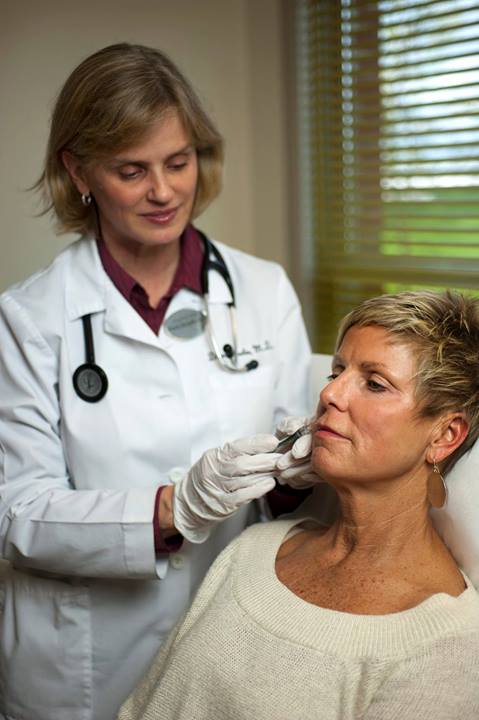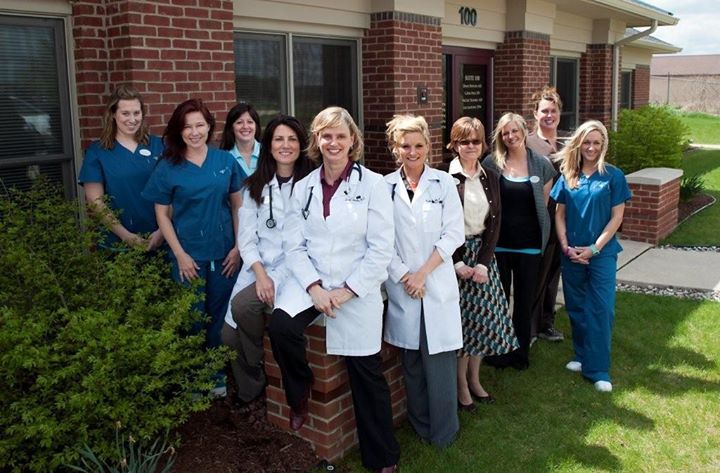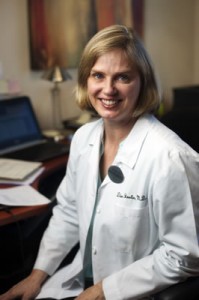Diane Howlin, MD, FACP of Chelsea Medicine and Laser in Michigan
/Name: Dr. Diane Howlin
Clinic: Chelsea Medicine and Laser
Location: Chelsea, MI
Website: chelsealaser.com
That's interesting: In 2001, Dr. Howlin founded Chelsea Hope Clinic, a free Saturday clinic for uninsured patients. In 2008, she was named the “Howard S. Holmes Humanitarian of the Year” by Faith in Action for this charity work. In 2009, she launched another not for profit free clinic, Chelsea Grace Clinic, for uninsured and underinsured patients in Western Washtenaw County.
I grew up in Dearborn Michigan. I played the violin in my youth and undergraduate years, touring Europe with an orchestra in the summers. That led me to learn German and be interested in cultures/language. I went to medical school at the University of Munich in German and married an Englishman. After medical school, we returned to the US for my residency in Ann Arbor, Michigan in internal medicine. I always loved surgery and surgical procedures. But a surgical residency seemed too hard on my family as we had two children. So I chose internal medicine and did my own procedures. I'd spend evenings in the medical library researching cosmetic office procedures like earlobe repair. That led to skin biopsies, lump and bump surgeries, and seeing the cosmetic effects of this work led me to lasers. Now the practice is fully integrated with both traditional internal medicine and aesthetic medicine.
As a female physician, what are the opportunities that you have that male physicians don't enjoy? Do you believe that you have (or not have) a competitive advantage with female clients?
As a female physician, it has felt very comfortable treating cosmetic patients as they are mostly female. This week, I had a C02 resurfacing on myself and patients have seen the recovery. They naturally ask questions and often book appointments. I'm certain that if I had a "normal" job, I'd have needed a few days off for down time as my skin looked like hamburger!
Also as a female internist, my medicine patients are mostly women too and the cosmetic side of my practice benefits from the medicine traffic. I have two female associates who also are practicing medicine and aesthetics which again brings in more business.
My clinic has 3 primary care doctors. I have an office and business manager to manage staff and accounts. My laser tech is especially good at teaching patients and has a degree in marketing. In addition to primary care services, we offer injectables including filler and Botox, laser hair removal, IPL, microderm abrasion, cold laser for smoking cessation/weight management or pain, laser liposuction, Smoothshapes, a European diode non invasive inch reducing laser, tattoo removal and laser facials, and C02 fractional resurfacing. Our Botox indications are medical too, such as for migraine, TMJ pain, anal fissures or pelvic pain. We have our own private label cosmeceuticals to help patients maintain their results. Our patients are from age 15-96, approximately 70% female.

What has been your driving force to integrate a aesthetic services into a primary care clinic? How did you determine if adding cosmetic procedures will be financially viable in your practice?
My interest in procedures naturally led to aesthetic services and I often did elderly patients a favor by removal facial lesions when they couldn't commute to another city for dermatological care. Dermatology and surgery colleagues were great resources when I had questions. In turn, they were happy for my medical patient referrals for Mohs or other surgery. My little town was a village at that time and had no cosmetic presence at all when I added them to my medical practice. The field was wide open. I researched lasers, prices, equipment and decided to purchase a used laser and test the market. I was in solo practice and had 3 exam rooms. Within less than a year, we couldn't even walk in the office as we were gridlocked for space. So I built a larger building and grew the practice by adding two physicians, a laser tech, and support staff. The laser salesman who sold me my first laser told me to add cosmaceuticals as people would want them. He said to learn injectables as that also went with the field and patients want them. That was some of the best advice I've been given. Everything he told me to do worked. He even told me to not admit to colleagues that the practice was doing well. I was to look at the floor, be pensive and say that it was "breaking even" when asked. I sign my correspondence to him "breaking even, Diane".
What was your most notable roadblock and how did you conquer it?
My biggest roadblock was trying to get admitted to training conferences and getting industry support from neurotoxin and filler companies. They weren't interested due to me being an internist. It felt discriminatory. So I went to Vancouver to Dr. Carruthers' course and thought I'd learn from them. That helped me attain excellent injection skills "outside of the box" and included some medical applications. The results sold themselves. I also spent a day with Dr. Mitch Goldman in California who was encouraging and had ongoing studies and results to share. This satisfied my scientific curiosity and taught me to think about procedures in new ways. Dr. Elliott Battle was very inspirational, both medically and from the business side. I just soaked up his teaching of defining who your patient is and "embracing" her. They have all been collegial and answered questions throughout the years about adding or not adding a laser, dealing with a complication, injecting an off label area. I also had frequent consultations from the Institute for AestheticTraining who flew in trainers from other states to treat our own patients. ASLMS has been very educational, scientific and welcoming.
What sets you apart from others?
Service and quality sets my practice apart from the others. Medicine in our area is very diluted by phone trees, physician extenders, long wait times, managed care. We have two live people answering the phones, give same day appointments and do most office procedures ourselves, eliminating the need for expensive specialist visits. Being a regular office MD, I have long term relationships with the patients. They trust me. I'd never violate that trust.
How efficient are your marketing and advertising campaigns?
Marketing efforts are reasonably successful. Our best ad is word of mouth. We try different media and track results. The successful ones get repeated. Since we're located between two larger cities, we cater to their populations in our ads. One is all paper print ads, the other cyber ads. We're always looking at ways to grow the practice and meet weekly to go over marketing. Dr. Mulholland from Toronto has given excellent advice that one can't know what works unless it is tracked. He also said to spend one hour a week on the business. If it doesn't get that attention, it can go astray very quickly.
Is there any specific technology that you're thinking of purchasing in the future? What exactly do you consider in determining which technologies to invest in?
Future technology: I only add one laser at a time to have just one payment at a time and just added C02 fractional resurfacing. So I'm on hold for a while. I have been looking at toenail fungus laser treatments, but find that when it's a medical indication, patients don't want to pay for it. I certainly have the patient base of diabetics with onychomycosis, but wouldn't want the laser to sit idle. As my lasers expire, I'll update the fleet as there are certain staples I couldn't do without, like IPL or hair removal.

Have you ever had any kind of experiences with technologies that you felt were oversold, either to the physician or to the patient?
Technologies that were oversold: absolutely. There is a lot of hype to launch a laser and one needs to sift through the ads to get to the science. We tried a C02 laser about 5 years ago that I sublet from another physician. The economy crashed in Michigan ahead of the great recession. Patients felt that they didn't get results for the money they paid. We loved the laser. But trying to convince a patient she had good results showing the before and after pictures was not fun. So we gave that laser back to its owner. Basically, my rule of thumb is that a procedure needs to be a home run to offer it. For me that means 90% satisfaction.
I've steered clear of Thermage due to acquiring dissatisfied patients from other practices who found it too painful or not effective enough.
Where are the most promising aspects of research in laser and cosmetic surgery? Are there any areas that look especially promising or that you think are over-hyped?
The most promising areas of research in laser and cosmetic surgery are minimally invasive rejuvenation with minimal downtime. Non invasive sculpting with radiofrequency, ultrasound or other energy sources is evolving rapidly. People want good value for their investment and are especially interested in Voluma due to the promise of two years duration of the filler. I didn't anticipate that it would sell due to the price.
What are your favorite inspiration sources?
My favorite inspirational sources are my faith, my husband, classical music: piano, violin and major symphony, and nature. I read biographies for a hobby and they can be about anyone from composers to St. Paul to Henry Ford. I just finished one about Gustav Mahler who died of endocarditis.
Where do you see cosmetic dermatology shifting and are there any procedures that have the potential for displacing existing medical technologies?
Cosmetic dermatology is moving to nonsurgical procedures with minimal downtime. Rejuvenation is paramount. Baby boomers are aging and want to look well and not tired. They have disposable income and choose to invest in effective treatments to keep their looks up. In Michigan where the economy was very weak, patients invested in their looks in order to stay employed. They felt if they looked young and fresh, they wouldn't be replaced by younger, less expensive workers. Thankfully the economy is improving and the cosmetic patient is more typical of the rest of the country.
I've learned to keep a regular watch on the business in order to help it grow. Get the best training possible to be at the front of the field rather than a follower. I attribute my clinic's success to having already been established in medicine in my town and not doubling the overhead by adding a new building, new staff, new insurance. Sadly, all the colleagues who trained with me and added aesthetics to their other practices have gone out of business. The differences are threefold: they doubled their overhead and had no traffic coming through because the aesthetic practice was a separate building. They also bought into the hype of the newest most expensive version of a laser for $150,000. I'd get the used one or the demo for $60,000 to test the field.
What's the best advice you've ever received as a physician and as an entrepreneur?
The best advice I've ever received as a physician and as an entrepreneur is to have a passion for what one does, define it and then do it best.

About: Dr. Howlin is a native of Michigan and graduated from the University of Munich medical school in 1987. This allowed for a unique education of European trends in medicine and natural ways of treating the body, many of which eventually came to the United States. Internal medicine internship and residency were completed at St. Joseph Mercy Hospital in Ann Arbor, Michigan. In 2000, she became a Fellow of the American College of Physicians, a prestigious award for internal medicine physicians and is currently listed as one of America’s top doctors. In 2007, she became a fellow of the American Society for Laser Medicine & Surgery.
Dr. Howlin has practiced internal medicine in Chelsea Michigan for over 22 years, six of which were for the University of Michigan Department of Internal Medicine as clinical assistant professor of medicine. Her philosophy in medicine is to provide a caring atmosphere with up to date, evidence-based medicine. Due to frequent requests and a long-standing interest in dermatological care, she added laser, IPL and aesthetic services to the practice in 2005. Being an internist is unique in allowing the depth of understanding of a person’s health that can make these procedures safer than having them in other settings. She has trained extensively around the country and internationally under experts in the field who invented these procedures (Drs. Carruthers in Vancouver) and is now a clinical preceptor for laser education for Lumenis and a certified Botox and Juvederm injector. Dr. Howlin is an advanced injector of Botox, utilizing the medication for unusual uses of pelvic floor muscle spasm (obturator), TMJ pain, migraine, hyperhidrosis, and anal fissures. Dr. Howlin also serves as an expert witness for the State of Michigan in internal medicine cases, both criminal and licensure.
Professional Memberships:
- American Medical Association
- American College of Physicians
- American Society for Laser Medicine and Surgery
- Michigan State Medical Society
- Huron Valley Physicians (Ann Arbor, Michigan)






